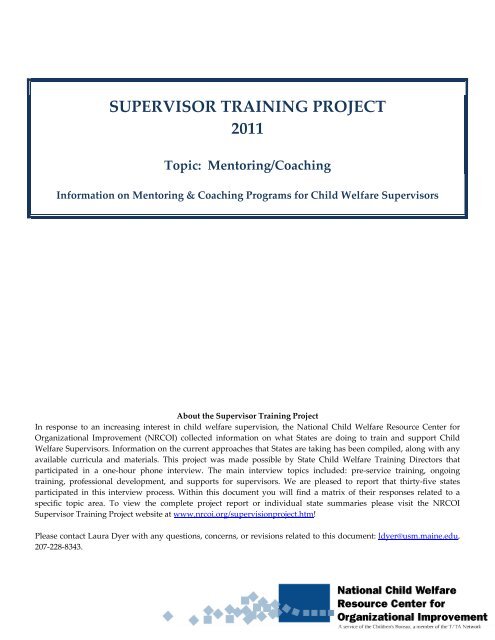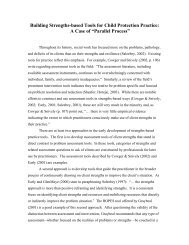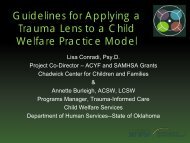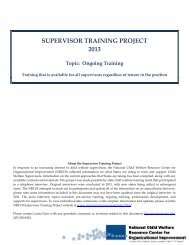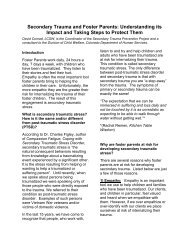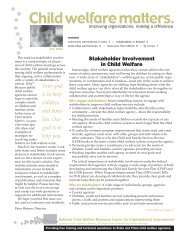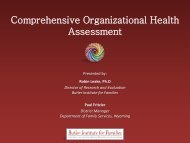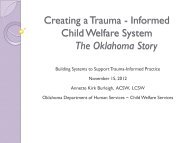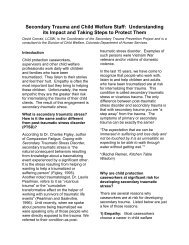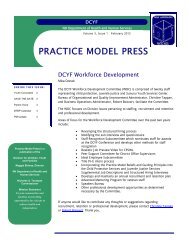supervisor training project 2011 - National Child Welfare Resource ...
supervisor training project 2011 - National Child Welfare Resource ...
supervisor training project 2011 - National Child Welfare Resource ...
You also want an ePaper? Increase the reach of your titles
YUMPU automatically turns print PDFs into web optimized ePapers that Google loves.
SUPERVISOR TRAINING PROJECT<br />
<strong>2011</strong><br />
Topic: Mentoring/Coaching<br />
Information on Mentoring & Coaching Programs for <strong>Child</strong> <strong>Welfare</strong> Supervisors<br />
About the Supervisor Training Project<br />
In response to an increasing interest in child welfare supervision, the <strong>National</strong> <strong>Child</strong> <strong>Welfare</strong> <strong>Resource</strong> Center for<br />
Organizational Improvement (NRCOI) collected information on what States are doing to train and support <strong>Child</strong><br />
<strong>Welfare</strong> Supervisors. Information on the current approaches that States are taking has been compiled, along with any<br />
available curricula and materials. This <strong>project</strong> was made possible by State <strong>Child</strong> <strong>Welfare</strong> Training Directors that<br />
participated in a one‐hour phone interview. The main interview topics included: pre‐service <strong>training</strong>, ongoing<br />
<strong>training</strong>, professional development, and supports for <strong>supervisor</strong>s. We are pleased to report that thirty‐five states<br />
participated in this interview process. Within this document you will find a matrix of their responses related to a<br />
specific topic area. To view the complete <strong>project</strong> report or individual state summaries please visit the NRCOI<br />
Supervisor Training Project website at www.nrcoi.org/supervision<strong>project</strong>.htm!<br />
Please contact Laura Dyer with any questions, concerns, or revisions related to this document: ldyer@usm.maine.edu,<br />
207‐228‐8343.
STATE Mentoring/Coaching Information 1<br />
Arizona<br />
California<br />
Assistant Program Managers (APM) are responsible for supervising and mentoring<br />
<strong>supervisor</strong>s in the State.<br />
Central Academy has a Field Based Trainer Program (FBT). FBTs employed by the<br />
Regional Training Academies (RTA) work with child welfare <strong>supervisor</strong>s on an ongoing<br />
basis to provide mentoring in the day to day work of being a <strong>supervisor</strong> as well as for<br />
professional development. FBTs attend Supervisor Core <strong>training</strong> to provide support, and<br />
then facilitate mastery of the competencies taught in Core. An FBT manual has been<br />
created that describes the program, including the role of FBT in working with<br />
<strong>supervisor</strong>s.<br />
Field‐Based Trainer Handbook<br />
Field‐Based Trainer Handbook Appendix<br />
Field‐Based Trainer Handbook Tools<br />
Northern RTA has expanded its ability to coach <strong>supervisor</strong>s and provide ongoing<br />
support. Southern RTA is piloting methods to assess whether changes in behavior in the<br />
workplace occur as a result of Manager and Supervisor Core <strong>training</strong>. Los Angeles is also<br />
working on developing capacity for <strong>supervisor</strong>y coaching in all 18 of its regional offices.<br />
Connecticut<br />
Delaware*<br />
Florida*<br />
Connecticut offers a mentoring program for their child welfare caseworkers and<br />
<strong>supervisor</strong>s which was developed in cooperation with Fordham University. The<br />
program pairs <strong>supervisor</strong>s with high‐level agency administrators for a one‐year period.<br />
During this time, mentors are expected to meet with their mentees one to two times per<br />
month to discuss their personal and professional development. This program allows<br />
<strong>supervisor</strong>s to shadow upper level positions that may interest them in the future. Over<br />
200 mentees have gone through the program since its inception seven years ago.<br />
Mentoring opportunities are available for <strong>supervisor</strong>s who are interested.<br />
Florida continues to offer a Mentoring through Qualitative Discussions <strong>training</strong> for<br />
<strong>supervisor</strong>s. This <strong>training</strong> teaches <strong>supervisor</strong>s how to facilitate monthly/quarterly<br />
mentoring discussions. This <strong>training</strong> is part of the statewide quality assurance<br />
framework and has now been woven into the Supervising for Excellence curriculum.<br />
Mentoring through Qualitative Discussion Training:<br />
Train the Trainer Videos (Parts I, II, and III)<br />
Participant Guide<br />
Trainer Guide<br />
PowerPoint Slides<br />
1 Please note that only the States that voluntarily mentioned mentoring/coaching are included here. States were not specifically<br />
asked about this topic.<br />
1
Georgia<br />
During Georgia’s Putting the Pieces Together pre‐service <strong>training</strong> period, each<br />
<strong>supervisor</strong> is assigned a mentor who has already been through the <strong>training</strong> and has<br />
previous <strong>supervisor</strong>y experience. Mentors are trained prior to assuming their role.<br />
Mentoring is offered via web, phone, and/or in‐person and participants are encouraged<br />
to continue the relationship for at least six months post <strong>training</strong>. Some mentors attend<br />
the class with the participants. Mentors are responsible for reviewing their mentee’s<br />
skill‐building activities, and must sign off on them in order for the <strong>supervisor</strong> to receive<br />
certification.<br />
Putting the Pieces Together Skill Building: Mentor Documentation<br />
Georgia’s Mentor Workbook<br />
Indiana*<br />
All new <strong>supervisor</strong>s have a mentor while in the New Supervisor CORE Training. This<br />
program utilizes Skill Assessment Scales following each <strong>training</strong> module. Supervisor<br />
mentors must complete the <strong>training</strong> provided, and meet a certain set of criteria.<br />
Supervisor Mentor Program for New Supervisors: Using Skill Assessment Scales –<br />
Updated June 2012<br />
Louisiana<br />
New<br />
Hampshire<br />
The Department of Social Services (DSS) and Northwestern Louisiana State University<br />
have contracted with Marsha Salus to train the Coaching/Mentoring Initiative. Coaches<br />
and mentors are current child welfare staff with <strong>supervisor</strong>y experience and/or retired<br />
child welfare professionals. All coaches and mentors have been trained by Ms. Salus to<br />
work with first line <strong>supervisor</strong>s during and after attending the Mastering the Art<br />
<strong>training</strong>. Casey Family Programs has contributed to the funding of this initiative.<br />
Currently, Louisiana has 22 coach/mentors trained (6 of whom are retirees). Coaches are<br />
given the opportunity to attend Mastering the Art, as well as other <strong>supervisor</strong>y <strong>training</strong>s.<br />
New Hampshire has adapted Connecticut’s Seasoned Mentoring Model (developed in<br />
conjunction with Fordham University). In this program, those who have been with the<br />
agency for five or more years are matched with mentors who have been with the<br />
program for seven or more years. Mentoring focuses on personal needs in addition to<br />
promoting a broader goal of teamwork and leadership. The original intent was to<br />
provide the program to all staff; however, the State has seen the greatest benefit for<br />
<strong>supervisor</strong>s. The program is used to mentor rising stars as well, with several participants<br />
having been promoted as a result.<br />
Mentoring Program Description<br />
New Mexico*<br />
New Mexico is working with the Mountains and Plains <strong>Child</strong> <strong>Welfare</strong> Implementation<br />
Center (MPCWIC) on the Piñon Project, a three‐year initiative to define a framework for<br />
engaging and working with children, youth, families, and stakeholders to create an<br />
environment that focuses on the safety, permanency, and well‐being of children and<br />
their families. As part of this <strong>project</strong>, a one‐day course on Coaching and Mentoring for<br />
<strong>supervisor</strong>s has been developed. This <strong>training</strong> is mandatory for <strong>supervisor</strong>s in each of<br />
the State’s ten implementation zones. It was originally trained by a consultant; however,<br />
future <strong>training</strong>s will be led by Protective Services staff trainers. The Piñon Project’s<br />
2
<strong>training</strong> and technical assistance group is looking to develop more supervision <strong>training</strong><br />
and technical assistance opportunities in the future.<br />
Piñon Coaching and Mentoring: Participant Manual<br />
Piñon Coaching and Mentoring: Trainer Guide<br />
Piñon Coaching and Mentoring: PowerPoint<br />
Oklahoma*<br />
In previous years, Oklahoma offered a mentoring program for <strong>supervisor</strong>s. Mentors<br />
were available to assist with any needs of the <strong>supervisor</strong>s (i.e. guidance on procedures,<br />
advice on cases). Unfortunately, this program has stopped due to budget limitations.<br />
CWTP publishes a Supervisor and Mentor Guide for all child welfare staff. This resource<br />
provides useful materials for <strong>supervisor</strong>s, as well as information about navigating the<br />
State’s child welfare <strong>training</strong> requirements.<br />
Oregon*<br />
Oregon is in their first year of a new mentor program for <strong>supervisor</strong>s. At the close of the<br />
pre‐service Clinical Supervisory Training, <strong>supervisor</strong>s receive an orientation on the<br />
mentoring program. During this orientation, <strong>supervisor</strong>s will receive a list of mentors,<br />
including information about each mentor’s location, demographics, and any<br />
specializations (<strong>supervisor</strong>s interested in a specific supervision area can then choose<br />
based on specialty). All mentors have previous child welfare supervision experience and<br />
must attend <strong>training</strong> on mentoring before they are able to participate in the program.<br />
Supervisors will consult with their superiors to choose an appropriate mentor. Once a<br />
match has been made, the goal is to have a face‐to‐face meeting once per month<br />
(frequency of meeting is flexible in order to suit all <strong>supervisor</strong>s’ needs). The pair will also<br />
meet with a manager on a regular basis. The program is designed to end after one year,<br />
but PSU anticipates that some relationships may extend informally. Participation in the<br />
program is not required, but highly recommended; if a <strong>supervisor</strong> elects not to<br />
participate, his/her <strong>supervisor</strong> must approve the decision. Peter Dahlin, a private<br />
contractor from California, has been hired to provide the <strong>training</strong> for mentors. At<br />
present, <strong>training</strong> has been offered twice. One mentee class has now graduated and is in<br />
the matching process with mentors. Oregon’s <strong>training</strong> partnership is tracking the<br />
implementation of this program carefully to ensure that the program does not become<br />
burdensome for participants.<br />
* 2012 Update: The mentor program is currently on hold as a result of staffing shortages.<br />
Rhode Island<br />
Upper management in DCYF has completed a Leadership Series and Strengths Coaching<br />
<strong>training</strong> in the past. This <strong>training</strong> has produced a group of 15 managers who have chosen<br />
<strong>supervisor</strong>s from their division to coach (usually for a three to four month period). In<br />
this scenario, the coach is out of the <strong>supervisor</strong>’s chain of command, making the<br />
<strong>supervisor</strong>s feel comfortable being open and honest about their work. This program is<br />
currently on hiatus, but the State hopes to revive it in Fall <strong>2011</strong>.<br />
3
Vermont*<br />
Wisconsin*<br />
A <strong>training</strong> coordinator assigned to each district discusses <strong>training</strong> needs with<br />
<strong>supervisor</strong>s on an individual basis and makes recommendations for available <strong>training</strong>s,<br />
as well as provides the opportunity to review pertinent <strong>training</strong> materials with the<br />
<strong>supervisor</strong>. The <strong>training</strong> coordinator serves as a mentor and coach to the <strong>supervisor</strong>s in<br />
his/her region.<br />
Wisconsin offers a coaching and mentoring program for <strong>supervisor</strong>s, which teaches them<br />
how to implement coaching and teaming in their agency (following the Family Teaming<br />
Model). The program is run at the county level and is designed to prepare <strong>supervisor</strong>s to<br />
become a coach for their own county.<br />
* State summary was updated in June/July 2012.<br />
4


